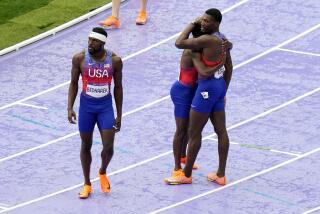Lewis Has Failed to Leap Fan’s Boundary of Purism
- Share via
When one is ensconced in the world of sport for as long as Jim Murray, I guess one loses his perspective. He wants to know why America has not fallen in love with Carl Lewis. Well, Mr. Murray, let me attempt to explain.
Day after day, America’s common man is bombarded with outrageous stories about athletes’ demands for more money, incentive clauses, attendance bonuses, etc. We read about athletes with marginal ability and lifetime losing records signing contracts for millions of dollars and we wonder how this is possible.
It seems if an athlete has one good season, he wants to renegotiate his contract. Moral obligations and ethics are thrown out the window. We wonder why a great performance should be expected from owners for such generous salaries? We wonder what happened to pride and honor among our heroes? Whatever happened to playing for love of the game? Or giving something back to the game?
We live in a culture that treats athletes as though they were gods. And, like Mr. Murray, we sometime lose sight of the fact that these men and women whom we idolize are, after all, just exceptional games players. That’s all, no more and no less. They are game players and they are handsomely rewarded for their skills, and they should be grateful that they live in a time when their particular talent is regarded with such esteem.
There will be a time, I believe, when such attention will be lavished upon more-deserving professions. But for now, it seems, the ability to put a ball through a hoop, or hit a ball over a fence or run 100 yards faster than anyone else is grounds for deification.
Which brings me to address Mr. Murray’s question. We are all very tired of the type of athlete mentioned above. We want and crave a purist. We hoped Carl Lewis might be that person.
Instead, we got a Madison Avenue conglomerate, a marketing scam. We saw an athlete in designer warmups, with the up-to-the-minute coiffure. We saw an athlete with an entourage of agents, managers and PR men. We saw a calculated and contrived effort to win our hearts and pocketbooks. Every move orchestrated to attain the almighty green. We saw a man who was something less than a purist.
A purist would have taken all of his jumps in an attempt to break what many consider to be the most remarkable record in track and field history. A purist would have given his all and thrown caution to the wind, a la Mary Lou Retton. And you know, had he taken those final jumps and broken his leg trying, his legend would be far greater than it is now, in spite of his four gold medals.
So, while Carl Lewis’ performance in the 1984 Olympic Games met all your criteria for greatness, Mr. Murray, it did not meet the criteria of the American people. We were hoping for a real, live hero, one who gives his all at all times because that’s all he knows how to do. In short, we were looking for a purist, pure and simple.
DANA MERINO
Burbank
To Carl Lewis:
I hear you have been getting a lot of bad press since the Olympics. In particular, there seem to be complaints because you don’t take all your jumps. And how many times in his heyday did Jesse Owens take all his jumps? Twice! Once in the 1935 AAU meet when he lost to Eulace Peacock and once in the Berlin Olympics when he didn’t have the competition won until the fifth jump. The day Owens set the world record, he took only one jump. He was NCAA champ in ’35 and ’36. In those days, jumps in the trials carried over to the finals. On both occasions, he took a couple of jumps in the trials and didn’t even compete in the next day’s final.
You should remember that not all sportswriters are track fans. And some of them don’t know Jack Spratt about track and field. As for the fans who boo when you don’t take all your jumps, they’re lucky to see the greatest sprinter-long jumper in history take even one jump.
You could do one thing for me, though. Why don’t you drop down to Mexico City or run up to Colorado Springs and put those records out of reach until well into the next century.
D.H. POTTS
Mathematics Professor
Cal State Northridge
More to Read
Go beyond the scoreboard
Get the latest on L.A.'s teams in the daily Sports Report newsletter.
You may occasionally receive promotional content from the Los Angeles Times.










